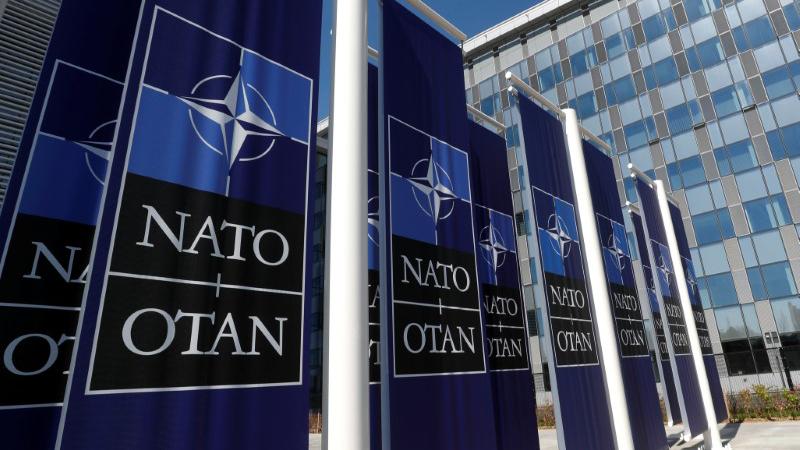Divided by Trump, NATO seeks unified front against Russia
Banners displaying the NATO logo are placed at the entrance of new NATO headquarters, in Brussels.
Briefly putting aside what NATO’s chief said were “serious differences” within the alliance, defense ministers are set to agree on Thursday to a plan to protect the North Atlantic against increased Russian naval strength, move troops more quickly across Europe and have more combat-ready battalions, ships and planes.
“We see differences on trade … on climate change and the Iran nuclear deal, and these are serious differences between NATO allies,” NATO Secretary-General Jens Stoltenberg told reporters on the eve of the meeting. But he argued that the alliance had weathered divisions in its seven-decade history.
US Defence Secretary Jim Mattis is also expected to try to ease tensions with European allies in the meeting over two days in Brussels. But three NATO diplomats told Reuters they were frustrated that Trump had decided to target Europe on so many different issues.
Trump’s “America first” rhetoric and inconsistent statements on NATO have morphed into policy that directly challenges European priorities, the diplomats said, citing new US metal tariffs and Trump’s withdrawal from the Paris climate change accord and the 2015 Iran nuclear accord.
NATO diplomats said they increasingly see the US president as an unknown quantity with a lack of interest in the transatlantic ties that Europe and Canada cherish.
“US Secretary of State Mike Pompeo came to NATO in April and made a very favorable impression, and everyone respects and admires Jim Mattis. But there’s a fear and an uneasiness about what Trump will do next,” one diplomat said.
Trump is expected at the NATO summit in Brussels in July, a year since he first came to the alliance and publicly admonished allies for not spending enough on defense.
Stoltenberg is expected to announce higher expenditure figures for NATO Europe in 2018 later on Thursday. But Trump’s envoy to NATO, Kay Bailey Hutchison, told reporters that the spending issue will remain a sore point for the president.
Following Russia’s annexation of Crimea in 2014, NATO leaders committed to raise their defense spending toward 2 percent of economic output by 2024, but under current projections, only 15 allies will meet that target.
“It will be an issue until we have that realized, it was a commitment made in Wales, to strive for that level,” Hutchison said of the 2014 Wales summit where leaders made the pledge.
No trade war yet
Mattis also finds himself in a delicate position in Brussels, trying to balance the need for a strong NATO, while backing Trump’s decision to impose tariffs.
Trump infuriated European Union members, Canada and Mexico by imposing tariffs of 25 percent on steel and 10 percent on aluminum, which experts say could bleed into US security relationships, even among America’s closest allies.
“I think it’s still premature to call it a trade war, because as it starts maturing, you know, there’s only give and take on these things,” Mattis said.
“And so what we’re looking for is fair and reciprocal trade. We can’t have a 2 percent on imported cars and other nations have a 10 percent tax on our cars when they’re imported to their country,” Mattis added.
NATO diplomats and analysts cautioned that European defense ministers were unlikely to lash out against Trump on Thursday, mindful of the United States’ role in defending Europe against a newly assertive Russia.
“On the one hand they want to protect this very productive and positive relationship. On the other hand, they have to send (Mattis) a message that this is just an untenable political situation that the White House has placed them in,” said Heather Conley, a former US State Department official now with the Center for Strategic and International Studies in Washington.
By Robin Emmott and Idrees Ali/Reuters
Reporting by Robin Emmott and Idrees Ali; Editing by Hugh Lawson.
The story you just read is accessible and free to all because thousands of listeners and readers contribute to our nonprofit newsroom. We go deep to bring you the human-centered international reporting that you know you can trust. To do this work and to do it well, we rely on the support of our listeners. If you appreciated our coverage this year, if there was a story that made you pause or a song that moved you, would you consider making a gift to sustain our work through 2024 and beyond?
